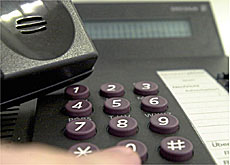Trade-off between freedom and security

Four years after the September 11 attacks in the United States, the public debate over civil liberties and security continues in Switzerland.
While the US adopted a series of tough anti-terror measures, the Swiss chose a more liberal approach. But there are those who say more needs to be done.
The Swiss authorities reacted some months after the attack on the World Trade Center in New York in 2001 by outlawing the Islamic extremist al-Qaeda groups and other organisations pursuing similar objectives.
In 2003, Switzerland ratified United Nations conventions aimed at preventing terrorist attacks and the funding of terrorism.
These included legal amendments that define the offence of funding terrorist activities and the obligation to identify people purchasing mobile phones for use with pre-paid cards.
But on the whole, Switzerland has exercised restraint in introducing anti-terrorism legislation.
“We have not seen legislative changes comparable to those enacted in the US or Britain,” points out Kosmas Tsiraktsopoulos, spokesman for Switzerland’s Federal Data Protection Commissioner.
“There appears to be widespread scepticism when it comes to repressive measures of the kind introduced in the US, even among those from the political centre-right,” said Niklaus Oberholzer.
He is a senior judge and formerly a consultant to a special parliamentary committee set up in the early 1990s to investigate surveillance practices of the federal police.
Impulse to control
Some groups, however, are pushing for an extension of police powers. They say increased surveillance and data-gathering capabilities would facilitate more effective action against terrorism.
Last August, the head of the domestic intelligence service called for legal amendments which would allow the creation of systematic records of suspected people as well as the surveillance of telephone calls, postal deliveries and emails, without the prior agreement of a magistrate.
When news of this was leaked to the media, the plan was roundly criticised by the justice minister, Christoph Blocher, who sent the proposals back for reconsideration.
But critics fear that even a watered-down version of the legislation will result in an increase in the powers of the secret services to engage in preventive surveillance and investigation activities.
Freedom and security
According to Judge Oberholzer, there is a tendency – in Switzerland and elsewhere – to try and resolve conflicts and social tensions by enacting criminal legislation.
“But we need to ask what degree of security can be achieved by this method, and to what extent we are prepared to sacrifice our freedoms in the process,” he said.
“Think of 1989. After the fall of the Berlin Wall, crime rates in eastern Europe soared. Obviously, a totalitarian state has more effective methods of suppressing crime. But I do not think this is the model we should aspire to.”
In any case, Switzerland does not lack the means of fighting terrorism, says Tsiraktsopoulos of the data protection commissioner’s office.
“The penal code contains a series of effective instruments for combating terrorism, as part of a procedure which also provides guarantees for suspects. But some people would like to be able to act without checks and restraints,” he added.
Judge Oberholzer also points out that the demand for new measures to prevent and tackle crime is not new and existed before the September 11 attacks.
“Maybe the insistence on internal security reflects the fact the state is not able to respond effectively to other threats, such as the financial problems affecting the social-security system or the rise in unemployment.”
Long arm of US law
Switzerland’s relatively liberal legislation can’t shield its citizens from the legal consequences of September 11. Since the Patriot Act came into force in the US, the authorities in Washington have tried to impose their regulations on the whole of the international community.
Under a rule that took effect in March, Swiss airlines must pass on details of their passengers before they fly to the US. If they fail do to so they can be denied the right to land.
The US authorities have also reserved the right to request information about foreign bank accounts and to block transactions.
Many Swiss citizens and companies have felt the impact of the tougher travel and immigration regulations. They include long waits to obtain visas and having their fingerprints and biometric data taken at US airports.
swissinfo, Andrea Tognina
Anti-terror measures in Switzerland:
Nov 2001: Government outlaws al-Qaeda.
Jan 2002: Six-month record on all telephone calls and emails becomes mandatory.
Dec 2002: Parliament rejects plans to introduce special anti-terrorism law.
Mar 2003: Details of recent mobile-phone customers have to be registered.
Jul 2004: Bilateral deal with US to combat terrorism.
Oct 2004: Details of all pre-paid mobile customers must be registered.
Mar 2005: Swiss airlines must pass on details of their passengers flying to US.
Following the September 11 attacks, the Swiss authorities adopted several measures designed to combat terrorism more effectively.
Swiss legislation has nevertheless remained fairly liberal and has not undergone changes comparable with those introduced under the Patriot Act in the US.
Proposals to radically increase police powers of preventive investigation and data-gathering, put forward by the domestic intelligence service, caused a public outcry.

In compliance with the JTI standards
More: SWI swissinfo.ch certified by the Journalism Trust Initiative











You can find an overview of ongoing debates with our journalists here . Please join us!
If you want to start a conversation about a topic raised in this article or want to report factual errors, email us at english@swissinfo.ch.